Film Inquiry Recommends: Underrated War Movies

Alex is a 28 year-old West Australian who has a…
Over at our official Facebook page, we are currently posting daily film recommendations, with each week being a different theme. This is a collection of those recommendations! This week’s theme is great war films from all over the world.
War films are always a popular genre in cinema, with most being focused on the modern state of conflict, featuring drone technology and international settings. When asked about great war films, most people mention Saving Private Ryan, Platoon, Full Metal Jacket and Apocalypse Now. Here’s some underrated films that are definitely worth watching.
1. Overlord (1975, Stuart Cooper)
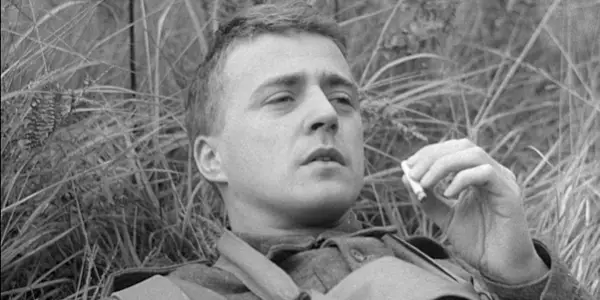
A terrific character study on the effects of war on young soldiers, Overlord is an interesting black and white war film which sadly remained unreleased for years. Overlord is quite different in its approach, as director Stuart Cooper was given hours of archival footage of British training camps and The Blitz, so half of the film is archival documentary footage and the other half is narrative shot by Cooper, where he used cameras and lenses from the 1930’s to make the footage look legitimate.
Tom (Brian Stirner) is a young regular soldier who we follow through his call up, his training and his induction into the brutal landscape of war. He frequently has premonitions of his own death, as he slowly realises what he’s getting himself into. Tom’s involvement in many different events during his training highlight the large amounts of destruction and tragedy that frequently erupts during war, using the plain everyman of Tom to act as the guide to these different events.
For unknown reasons (possibly due to its arthouse style) the film never received any US distribution. It got a brief revival in the 1980’s due to being shown on Z Channel, as programmer chief Jerry Harvey was a big fan (after a festival screening) and contacted Stuart Cooper personally to show the film on his channel, which Cooper was ecstatic about. The film was officially released on DVD for the first time in 2008 through the Criterion Collection, which finally allowed a mainstream audience to view this great film.
2. The Inglorious Bastards (1978, Enzo G. Castellari)
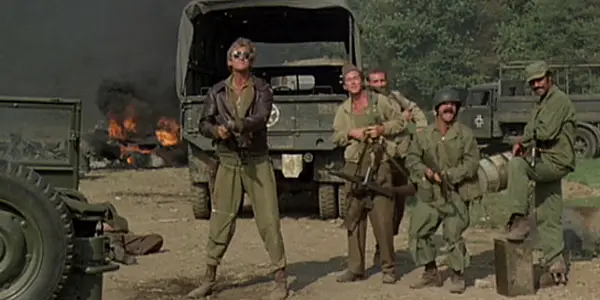
Much like Django Unchained and Django, The Inglorious Bastards is a film which had elements and its title taken by Quentin Tarantino and transformed into a new film (Inglourious Basterds is officially not a remake of this film despite the similarities). Enzo G. Castellari’s Italian war film is a gritty grindhouse take on the Dirty Dozen formula, one of the better war exploitation pictures to come out of Italy. Rogue American soldiers Lieutenant Robert Yeager (Bo Svenson), Private Fred Canfield (Fred Williamson), murderer Tony (Peter Hooten), thief Nick (Michael Pergolani) and coward Berle (Jackie Basehart) are transported into a military prison.
However, the convoy is attacked by the Germans and they survive and flee with the intention of cross the border of Switzerland. Along their journey, they fight against a German platoon and capture the German prisoner Adolf Sachs that offers to guide them to the Swiss border. When they accidentally kill an undercover American troop who was in the middle of a dangerous mission, the gang decide to finish the mission they ruined, leading to cataclysmic results. This action-packed and fun war film never takes itself too seriously and its exploitation roots means the film is designed for pure audience entertainment.
3. Cross of Iron (1977, Sam Peckinpah)
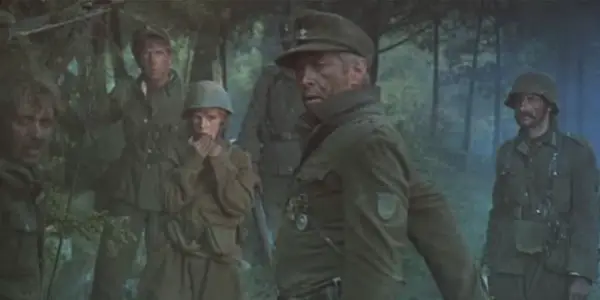
Sam Peckinpah’s last great film, as after this his health declined, and added studio pressure made Peckinpah make mainstream fodder such as Convoy and the awful The Osterman Weekend. Based on the 1956 novel “The Willing Flesh” by Willi Heinrich, Cross of Iron is about arrogant Prussian Captain Hauptmann Stransky (Maximilian Schell) and his obsession with obtaining an Iron Cross (a coveted army medal for bravery), even if it means costing him the lives of his own squad.
James Coburn stars as Rolf Steiner, one the many films which required Coburn to do an accent he couldn’t completely pull off (like an Australian in The Great Escape and Irish in Duck, You Sucker!). Steiner, recently promoted to Sergeant, is forced to share a bunker with the cowardly Stransky. A bloody battle between Steiner’s men and Russian troops, results in the death of Lieutenant Meyer, the man who led the battle. In order to try and get the Iron Cross, Stransky lies and tries to tell people he led the battle. He forces the entire squad to agree except for Steiner, who outright objects to Stransky’s lying.
When the squad is forced to move bunkers due to increasing danger, Stransky purposefully doesn’t tell Steiner and some of his loyal men, leaving them for dead. This leads to Steiner grabbing his remaining men and hunting down Stransky. The interplay between the characters is great and the brief action scenes throughout the film are well-directed by Peckinpah. The film’s unique approach to the worn out war genre makes it stand out. Orson Welles described the film as “the best anti-war film” he’d ever seen.
4. Heroes Shed No Tears (1986, John Woo)

Made right before the game-changer A Better Tomorrow, Heroes Shed No Tears is an action-packed Hong Kong war movie that’s more First Blood Part 2 than Saving Private Ryan. The Thai Government hires a group of Chinese mercenaries to capture a powerful drug lord near the Vietnamese border. They frequently run into problems after the drug lord is captured, with his men chasing the mercenaries and a sadistic Vietnamese military sergeant on their tail as well. This film has some of John Woo’s trademark elements, which went to become popular after the success of the Better Tomorrow series.
John Woo was not a fan of the finished product after this film was shot, but the success of the Tomorrow pictures lead to this finally getting a cinematic release, which ended up garnering positive reviews. There’s a lot of action packed into this film, with a whole variety of crazy segments such as eyes being sewn shut, people eaten and a tyre fight. One problem that frequently arises in Hong Kong and Korean cinema is the local traditions and beliefs which are used in the film, which have a rough translation once hitting international viewing. Heroes Shed No Tears has this with the frequent over-the-top crying scenes, which are very theatrical and take away from the bombastic action scenes.
5. Play Dirty (1969, Andre De Toth)
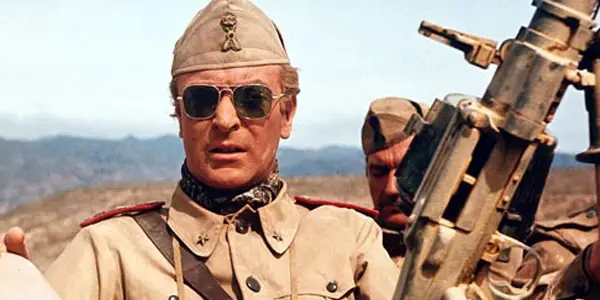
Play Dirty is a British Dirty Dozen led by a disgruntled Michael Caine, which should be enough information to check out this film. Captain Douglas (Caine) is a British army leader who is ordered to lead a band of mercenaries into the desert. Their mission is to knock out an enemy fuel reserve. Douglas must deal with a veteran Colonel (Nigel Green) who is fascinated with using old history tactics to fight their battles. Cyril Leech (Nigel Davenport) is the experienced mercenary hired by Brigadier Blore (Harry Andrews) to help guide Douglas and his group through the dangerous plot.
Whilst Colonel (Green) doesn’t want to bring along Douglas, he is promised an extra 2,000 pounds if he is kept alive, which creates a nice line of tension throughout the film. Much like any good plan, people start to get sold out and enemies start to get hot on their tail, upping the antics which devolves into staunch action at the end. This was the last film of director Andre De Toth, a B-movie director who is most famous for the Vincent Price horror film House of Wax. This film was buried in the late 60’s and early 70’s due to being one of the many Dirty Dozen clones, even though this was one of the better ones due to its subversive nature and interesting plot twists.
6. Five Graves to Cairo (1943, Billy Wilder)
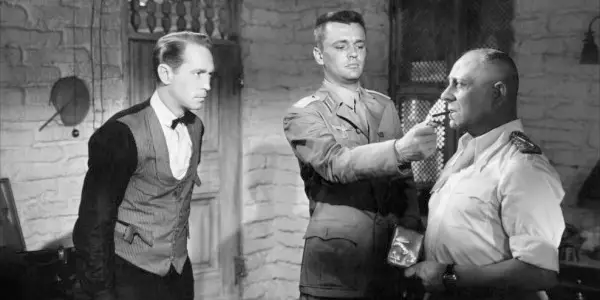
One of the earlier films of film master Billy Wilder, director of classics such as Double Indemnity, The Apartment and Some Like It Hot. During World War II in 1942, a lone soldier survives the German romp of the British forces outside Tobruk. Dazed with sunstroke, Corporal John J. Bramble (Franchot Tone) makes his way to the only refuge he can find in the desert: The Hotel Empress of Britain.
Taken in by the Egyptian owner and glum French maid (Anne Baxter), Bramble is shocked to find the hotel is set to become the base for the German High Command en route to the Suez Canal. Adopting the identity of the hotel’s waiter, Paul Davos, he is taken into the inner circle of none other than Field Marshall Erwin Rommell (Erich von Stroheim), leader of the operation. Rommell reveals his secret strategy to take the rest of Egypt: a mysterious plan code-named Five Graves To Cairo. This sets in motion a plan for Bramble to try and find out this mysterious plan and save the day.
Wilder’s underrated war film is an example of using a single location really well, creating a great landscape for the preceding action and being shot by some eye-catching cinematography. Erich Von Stroheim steals the show as Erwin Rommell, creating a dynamic bad guy that you love to watch slowly try to take over Egypt whilst being slowly undermined under his nose. Wilder followed up with the game-changing noir film Double Indemnity, starting a consecutive series of films which would solidify Wilder’s classic career in Hollywood.
7. The Last Hunter (1980, Antonio Margheriti)

An exploitation Vietnam war movie by Italian director Antonio Margheriti (whose name might ring a bell to fans of Inglourious Basterds), The Last Hunter is a nice alternative to the more dramatic war movies. After the suicide of his best friend, Captain Henry Morris (New Zealand actor David Warbeck) accepts a suicide mission to go behind enemy lines and take down a radio tower that is broadcasting anti-American propaganda. Due to the success of Michael Cimino’s The Deer Hunter, Margheriti wanted to jump on its success by making an unofficial sequel (a frequently done thing in Italian cinema at the time, the most famous being Fulci’s Zombi), but copyright issues forced Margheriti to rename this film The Last Hunter.
Trying to differentiate himself from The Deer Hunter, Margheriti decided to make his Vietnam film light and fun, focusing on the B-Movie action rather than the political issues and morality tales usually seen in other war movies. This film used the same locations as Apocalypse Now and the crew ran into the same type of problems that Francis Ford Coppola did shooting his film. The film’s gory action scenes and playful banter between its protagonists makes the film quite entertaining and one of the better war-based exploitation films to come out post-Vietnam.
Can you recommend anymore war films that you feel are underrated? Let us know!
Does content like this matter to you?
Become a Member and support film journalism. Unlock access to all of Film Inquiry`s great articles. Join a community of like-minded readers who are passionate about cinema - get access to our private members Network, give back to independent filmmakers, and more.













